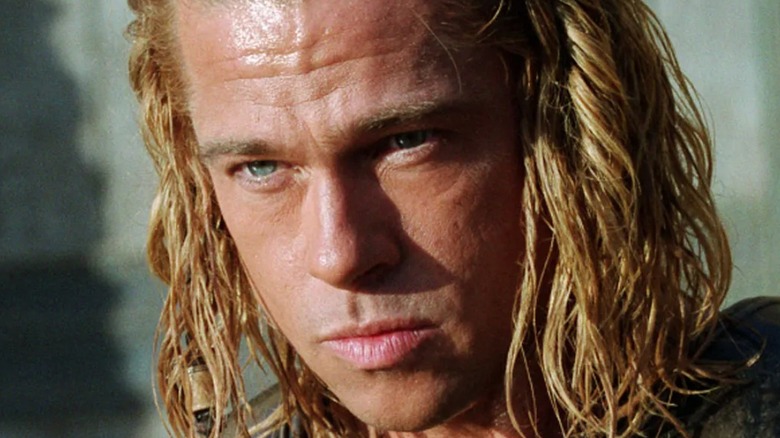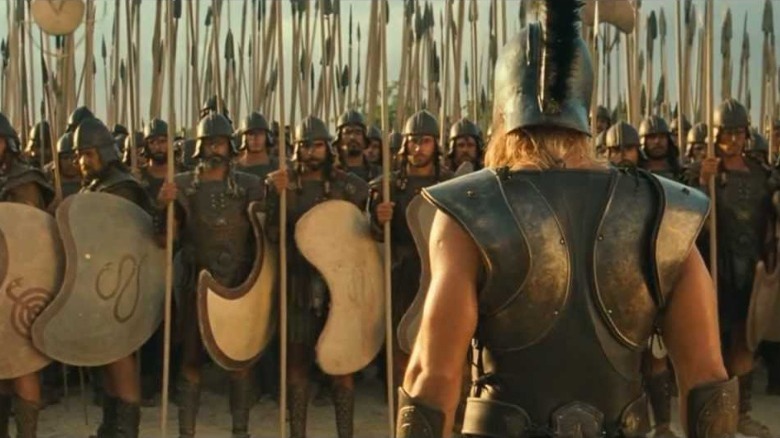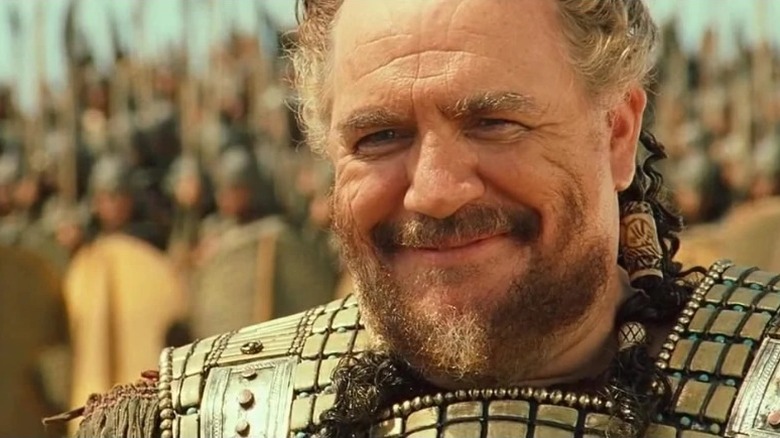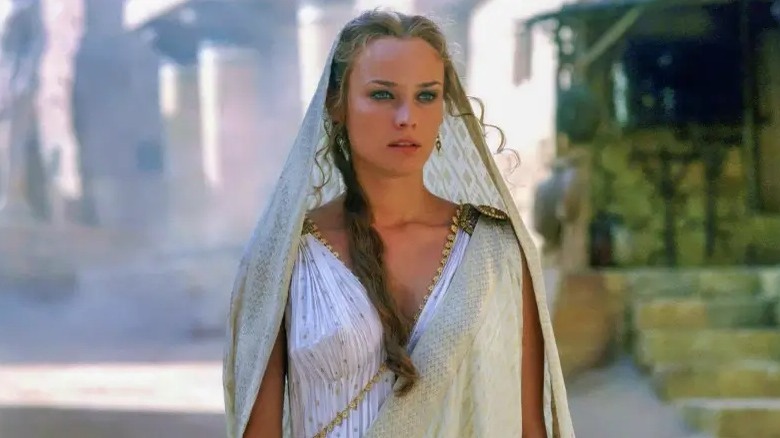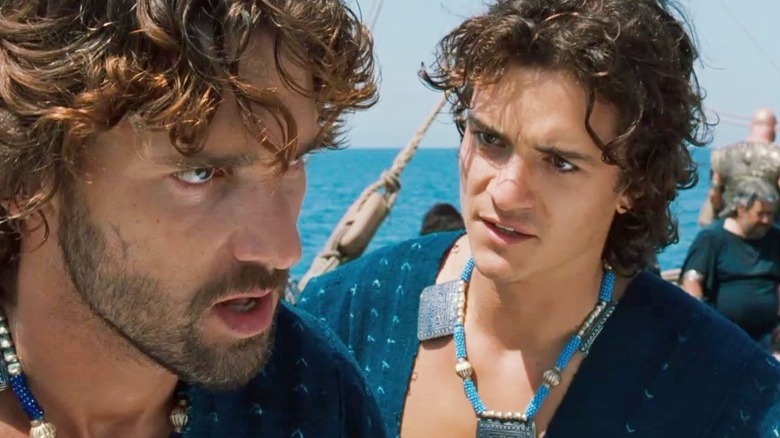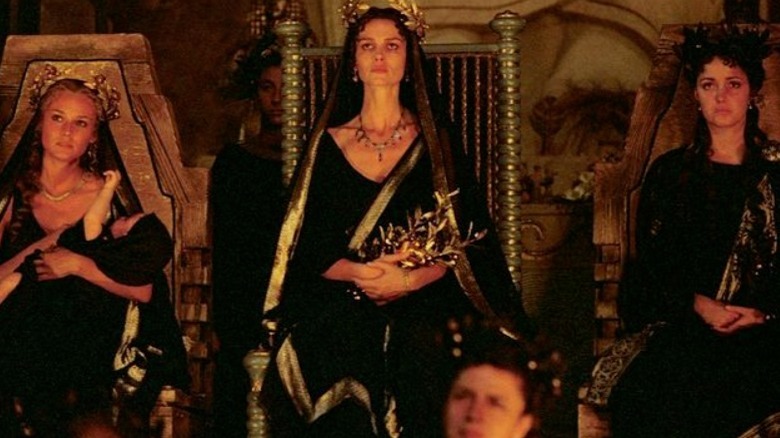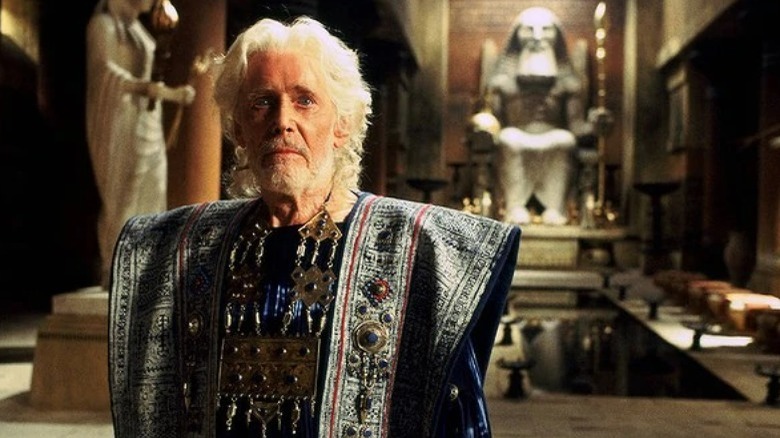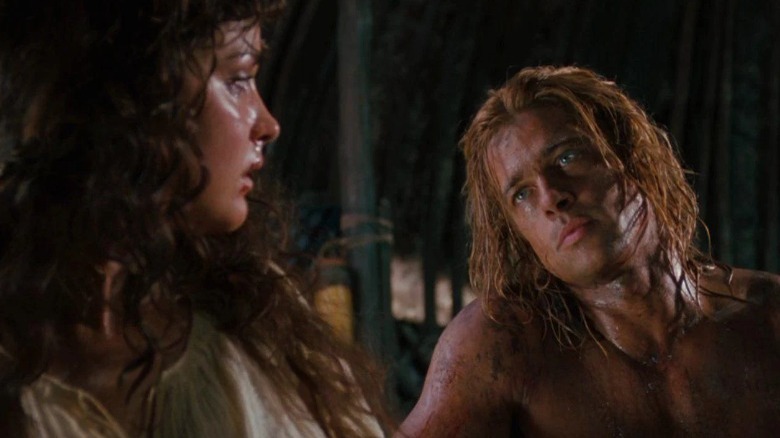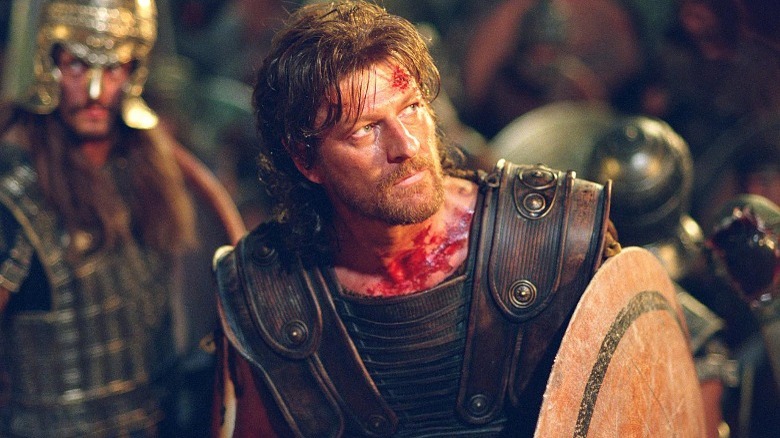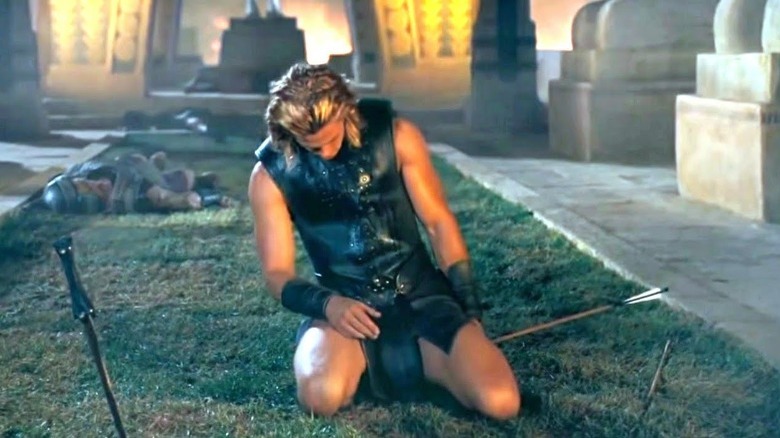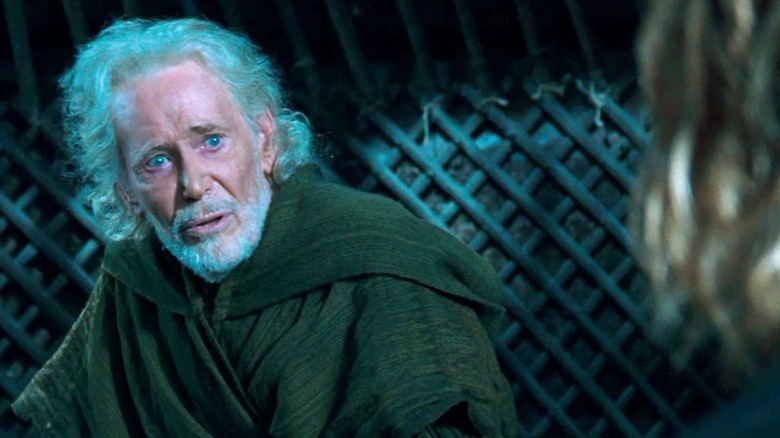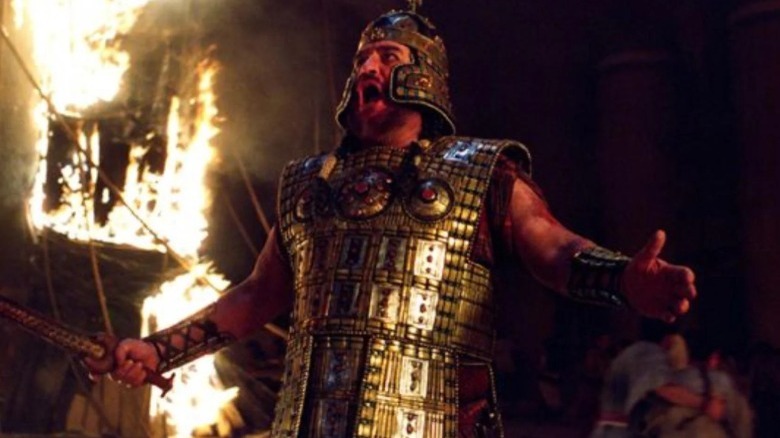The Ending Of Troy Explained
"Troy" is the embodiment of this line delivered from the hero of Homer's "Odyssey": "War is young men dying and old men talking. Ignore the politics," Odysseus (Sean Bean) counsels his friend and fellow soldier Achilles (Brad Pitt). And as fate would have it, it's painfully real when married up with our own modern-day global conflicts. Men in power often vie for more in a torturous circle of death and greed. "Troy" is the adaptation of Homer's "Iliad" chronicling the sacking of Troy by the ancient Greeks. While many historians over the years have postulated the validity of Homer's epoch potentially being rooted in ancient history, there still isn't any clear credence behind such a claim (via BBC). Therefore, the Trojan War remains a staple of ancient Greek mythology.
"Troy" depicts Paris (Orlando Bloom), a lovestruck young prince of Troy, wantonly giving way to his heart's desire to free Helen (Diane Kruger) from her violent and crooked Spartan king husband, Menelaus (Brendan Gleeson), even amid peace talks between Sparta and Troy. He foolishly absconds with Helen tucked away aboard his boat when he, his older brother, Prince Hector (Eric Bana), and the Trojan party depart for home. This sends Menelaus into a rage destroying any lasting desire to maintain peace with Troy. He courts his brother, King Agamemnon (Brian Cox) of Mycenae, to go to war with him. Happily, Agamemnon calls the armies of all the kingdoms under his stewardship to go to war. He even convinces a resentful Achilles, a champion among the Greeks, to join the cause even if just for the glory. This tale of love, war, and tragedy has a lot to dissect. So, let's get to it.
The glory of war
Achilles is a man who answers to no one, not even kings. At least that is what he claims. Sure, he does have an abiding disdain for Agamemnon and isn't shy about calling the greedy monarch out for the filth that he is straight to his face. Yet, Achilles still shows up when Agamemnon demands it. But is it because Agamemnon commands the warrior who leads the elite Myrmidons or is it some other reason? Achilles makes no secret of it, he wages battle, often at the behest of Agamemnon, simply for the glory. Combat is all he has ever known, so he can't very well make a career in anything else. However, practice makes progress, and since combat has been the single focus of Achilles his entire life, he's damn near perfection.
Agamemnon hates Achilles for his insolence but understands he needs the warrior. He knows that Achilles won't do his bidding just because he commands it. Instead, the king listens to his advisors and dangles the carrot of glory in Achilles' face. Essentially, most of Achilles' entire career has been one big manipulation of the King of Mycenae using the warrior's greatest desire to be remembered for his exploits in order to secure his sword amid his campaigns to conquer Greek kingdoms. But, of course, Achilles is no dummy. He understands the manipulation, which is why he disdains the king. He doesn't agree with Agamemnon's methods or politics, but he nonetheless reaches for his own notoriety. After all, creating a lasting memory that echoes through the ages is the only true way to gain immortality and live on forever.
Agamemnon's conquest
Paris and Helen's forbidden love was always going to cost Troy a heavy price, but it's most assuredly not Agamemnon's motive. The King of Mycenae has no interest in defending his brother's honor, or at least what shred of it the man truly has. In fact, Paris' absconding with the queen of Sparta is a gift to Agamemnon. It gives him a façade to hide behind as he eagerly accepts his brother's plea to go to war with Troy.
Menelaus only fights for his ego. His pride is shattered when Paris "stole" his perceived property, which is exactly how he treated Helen. Menelaus would engage in promiscuity with other women in his court. In fact, he explicitly tells Hector that his wife, Helen, is just for breeding. When Agamemnon assures his brother that they'll get his wife back, Menelaus states that he only wants her back so that he can kill her with his own hands. In other words, this war is being waged by men who fancy themselves as gods among men. Their greed supersedes all and no number of attempted reconciliations with Sparta from Troy's upper echelon would do. The fall of Troy is destined from the moment Agamemnon comes to power. While Helen may be the catalyst, Agamemnon would have found another reason if her romance with Paris never occurred.
Homer's Iliad and creative liberties
"Troy" feels like a truly grounded war film depicting a moment in history. But in all actuality, it's an adaptation of Homer's "Iliad," the first in a pair of epic Greek poems authored by Homer in the 8th Century B.C. The film shed Homer's use of the gods in the tale and only depicted the men in the story as god-fearing. Furthermore, "Troy" took a few other liberties with the material.
In the film, Patroclus (Garrett Hedlund) is the cousin of Achilles. The warrior acts as somewhat of an older brother to Patroclus and teaches him all that he knows in the art of combat and war. When Patroclus is killed, his death inflames Achilles who kills Hector in retaliation. The "Iliad" never mentions that Patroclus and Achilles are related. In fact, it often depicts them as close friends and potentially even romantically entwined.
The length of the war is, perhaps, the most egregious alteration of Homer's original work. The film depicts a war that lasts days, maybe weeks at best. Troy is a city with mighty walls and is primed for a lengthy defense during war. "The Iliad" shares that the siege of Troy lasted an entire decade. Furthermore, the film depicts Agamemnon's victory as short-lived when the priestess Briseis (Rose Byrne) unceremoniously ends his life. But in the actual story, he survives the Trojan war and is only later murdered by his wife.
Helen, the queen at the center of it all is said to have been married off to Menelaus at a young age by her parents. However, Helen was actually the daughter of the king and queen of Sparta, making her royalty before her nuptials with Menelaus.
Love transcends reason
One of the primary themes of the film is love. Some interpret the story of "The Iliad" as more of an abduction than an actual love affair making Paris' plight infinitely less noble (via World History). Still, "Troy" accurately depicts the Trojan War as being the result of Helen's removal from Sparta because of Paris. Like the Shakespearean tragedy of "Romeo and Juliet," the film depicts a love that stands above reason. Perhaps love does truly make us do foolish things, but in Paris' case, he's responsible for the deaths of countless men on the battlefield for his actions. And it's not like he couldn't have foreseen these consequences either.
Hector wisely advised his brother to stay away from Helen during their time in Sparta. Even though Paris lies through his teeth about sleeping with the wife of Menelaus, Hector is no slouch. He knows exactly what is going on and even threatens his brother should he jeopardize the safety and security of their home in Troy. Yet, Paris still does the unthinkable regardless calling Hector's bluff. Hector does care for his brother and despite his fury over the indiscretion, he aims to protect him by returning to Troy and preparing for war. The question on everyone's mind for young Paris after the film wraps is: Was it worth it? It seems, even as he guides the survivors through the mountain pass, that he would do it all over again given the opportunity.
Women are second-class citizens
In the times of ancient Greece, it seems chivalry wasn't quite invented yet. Even in modern times, equality is a struggle, but in the ages when corrupt men had all the power over nations, women were often treated poorly. "Troy" depicts this tenfold with the film's villains, Menelaus and Agamemnon. As we've previously covered, Menelaus only regarded his own wife as a tool for bearing children. Otherwise, he'd wield his power and authority to sleep with whomever he wanted to in the kingdom of Sparta. Agamemnon doesn't do much better in his treatment of Briseis considering her nothing more than the "spoils of war."
Even the tortured anti-hero Achilles can hardly rein in his emotions enough to stay dignified in his relationship with Briseis. Not only does he hold her as a prisoner, but he also promises her that he won't hurt her and later breaks that promise when he flies into a rage over the death of his cousin.
And let's not forget the leadership of this era. When Priam holds counsel with the elders and elites of Troy, there's not a single woman among them. All women in this film are relegated to love interests or objects for the abusers depicted on screen. Even Helen is ultimately disrespected by her own lover Paris. How might you ask? Well, he never harms her physically or verbally abuses her, but he often refuses to allow her to use her own agency in matters of war. She voices her hesitancy to leave with Paris because of the bloodshed that would result, but her voice ultimately falls on deaf ears. "Troy" is a story about the conflict of the egos of men, and women and children are the ultimate victims.
Betrayal of the gods
Homer's "Iliad" made liberal use of the gods of the Greek Pantheon. For instance, when Priam attempts to sneak into the enemy camps and plead with Achilles to return his son's body, he's guided by the god Hermes, a divine messenger to the rest of the gods on Olympus. But "Troy" does away with the gods in favor of a more grounded take on the Trojan War. Still, the gods are still very much a part of the discussion among the film's characters.
Agamemnon mostly considers himself a god among men and hardly regards any of the Greek deities. Achilles looks upon the pious servants of the gods as foolish. Whether he believes in the gods is up for debate. But he isn't afraid to desecrate their temples knowing that the gods have done nothing for him in his lifetime.
Priam is a devout believer in his priests and mystics who claim to have insight into omens and messages from the gods on high. Hector sees the whims of the priests as foolish and illogical given the war in front of them. Using his head, he knows that strategy is key and that they shouldn't wait for signs from gods who care little for their fates. Yet, Priam makes every decision based on what he perceives as the will of the gods which ultimately causes him to lead Troy to ruin. Perhaps Priam is so devout that in his final moments he truly believed that Troy's destruction was the will of the gods. Either way, it's a searing indictment of overzealous piety given that the villainous Agamemnon wins the day without seeking divine help.
The gift of mortality
What would it be like to be a god? At first, you might fancy the idea entirely given that you'd be immortal and impervious to pain and sorrow. However, you'd only like to be invincible to pain because you know what pain is. Imagine living only a life of divinity. Because you wouldn't know pain or sorrow, that means you also wouldn't know joy and pure bliss. It's a hard idea for us to wrap our minds around, but our moments of happiness are only effective because we have the backdrop of our frailty and sadness to compare them to. In effect, there would be no highs without any lows. Your story would be a stagnant straight line neither experiencing the worst nor best life had to offer. In fact, you couldn't even say that it's truly living.
Achilles understands this. Perhaps, he not only fights for glory but for the feeling of being truly alive — as twisted as that might seem. The warrior explains to the priestess why the gods aren't as important as everyone thinks they are. "The gods envy us. They envy us because we're mortal, because any moment may be our last. Everything is more beautiful because we're doomed. You will never be lovelier than you are now. We will never be here again," he softly states to Briseis. In effect, Achilles is romanticizing our pain and suffering. But he's also not wrong. There's a deeper meaning to our lives the moment we understand how finite they really are. Life is meant to be lived.
Odysseus' journey is just starting
In Odysseus, Achilles finds a trustworthy compatriot. As the king of Ithaca, Odysseus bends to the whims of Agamemnon for the sake of his own people. But ultimately, he's a man of honor despite seemingly fighting for the villain of the story. He's also incredibly intelligent and cunning. Perhaps, some of the wisest counsel Achilles receives is from his friend Odysseus. There was never a sequel to "Troy," but if there were, it'd be based on Homer's "Odyssey," the second of his epoch Greek poems. But of course, if the film were to come to fruition, it'd truly have to embrace the mythology of the Greek era including gods and monsters.
Odysseus' journey home following the war is wrought with perils and danger that delay him from seeing his kingdom for another 10 years simply because he offends the sea god Poseidon. During this misadventure, his crew is killed along the way by the cyclops Polyphemus, Poseidon's son, a witch-goddess named Circe, and a six-headed beast named Scylla, among other perils. While lost at sea for 10 years, suitors attempt to use up his wealth and marry his wife to claim his throne. He triumphantly returns to claim what is rightfully his. The journey is a harrowing one, and "Troy" is just the start of it all. With the film's focus on Odysseus at times, it would've been thrilling to see his story's continuation upon his journey home. Perhaps we'll just have to settle for the 1997 miniseries "The Odyssey" to get our fill of this adventure.
Achilles achieves immortality
The legend of Achilles is one that echoes through the ages thanks to Homer's "Iliad." If he were a real person, then he certainly would've obtained the glory that he so desired given that nearly 3,000 years later we are still cognizant of his story. Ultimately, Achilles vied for immortality — at least the only form that a human could achieve — because he wanted to be remembered through the ages. But in the final moments of "Troy", he sheds his care for glory in favor of finding and protecting Briseis during the sacking of Troy.
He does manage to find the priestess and kills those who attempt to do her harm. But Paris decides to dish out his own brand of vengeance upon Achilles for killing his brother Hector. He shoots Achilles with his bow and arrow. The first arrow pierces Achilles' heel. The succeeding arrows sink into the warrior's chest. He pulls the arrows from his body. Eventually, he succumbs to his wounds with the only arrow remaining in his corpse being the one that pierced his ankle. As the myths of Achilles go, it is said that his mother dipped him in the river Styx when he was a baby in order to make him impervious to physical threats. Though, she held him by his ankle. So, that part of him didn't receive the protection of the river making it his weakness. This legend, of course, wasn't relayed in the grounded take of "Troy." But it was thought that the arrow Paris shot into his heel is the one that finally ended him. Thanks to the legend, the Achilles tendon is named after him. Without truly desiring it in the end, Achilles does achieve the immortality he once sought after.
The hypocrisy of war
"Troy" is, indeed, a cautionary tale. It highlights how easy it can be to insight conflict that ultimately results in a clash between nations. We see that today as leaders of countries charge into war even without the support of their people. The result is unmitigated death. During the Trojan War, Achilles was the grim reaper if nothing else. He sends countless souls to the great beyond before the siege of Troy is over. War brings out the worst in men. After Patroclus is killed by Hector, who thought he was fighting Achilles given that Patroclus was donning Achilles' armor, the Myrmidon leader is enraged. Achilles races to the front gates of Troy and calls upon Hector to come and fight. It's there that he slays Hector, ties his corpse to his chariot, and rides off back to the Greek encampment.
Later, Priam visits Achilles in his tent surprising the soldier. Achilles makes it clear that he respects Priam's courage for coming into enemy territory just to retrieve his son's body. Achilles feels a sense of remorse but justifies his deed because Hector killed his cousin. Priam then rightly points out, "How many cousins have you killed? How many sons and fathers and brothers and husbands? How many brave Achilles?" It's a statement that truly humbles the warrior. War is an endless cycle, and there's no accounting for emotions, relationships, or familial bonds among enemies.
The sacking of Troy
The film ends with the fabled infiltration of the Greek army by utilizing the Trojan horse, a wooden construct used to gain entry to the city. The Trojans think the Greeks abandoned their campaign and left the large wooden horse behind as a token of peace. However, some of the Greek army men are hiding inside the horse. After the Trojans bring it inside the city walls, the Greek soldiers sneak out at night and open the city gates allowing the rest of the armies through to invade and sack Troy. What ensues is the stuff of nightmares as Greek soldiers ravenously kill innocent civilians, including children. Priam dies knowing that his city has fallen and that he's lost everything.
The way "Troy" positions its characters, the good guys lose and the bad guys win. While the film may not be an entirely accurate depiction of Homer's "Iliad," it does fall in line with the tradition of Greek myth. That is that the story is a remarkable tragedy. The feel-good stories of modern pop culture typically always see justice and light prevail among the darkness. But the ancient Greeks are famous for highlighting the cruel nature of humankind and even the universe at large in their tales of gods and men. There is no doubt that the fall of an entire city is tragic. What makes it even worse is that most of the heroes are involved in death during the war. It's not entirely dour, of course; the story offers at least a glimmer of hope for the remaining Trojans seeking a new life beyond their walls.
